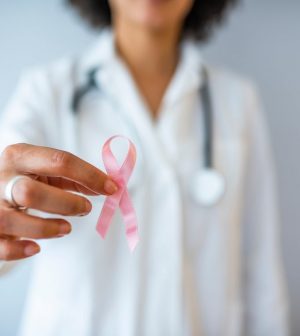- Could Your Grocery Store Meat Be Causing Recurring UTIs?
- Are You Making This Expensive Thermostat Error This Winter?
- Recognizing the Signs of Hypothyroidism
- 10 Strategies to Overcome Insomnia
- Could Artificial Sweeteners Be Aging the Brain Faster?
- Techniques for Soothing Your Nervous System
- Does the Water in Your House Smell Funny? Here’s Why
- Can a Daily Dose of Apple Cider Vinegar Actually Aid Weight Loss?
- 6 Health Beverages That Can Actually Spike Your Blood Sugar
- Treatment Options for Social Anxiety Disorder
Some Breast Cancer Patients May Not Need Post-Op Chest Wall Radiation

Radiation therapy for breast cancer comes with a host of side effects, including conditions as serious as heart problems and pneumonia.
Now, a new study says some breast cancer patients can safely skip radiation therapy without risking their cancer coming back.
Women who didn’t get radiation following a mastectomy had similar rates of 10-year survival as those who did get radiation, according to results from the BIG 2-04 MRC SUPREMO clinical trial presented at the San Antonio Breast Cancer Symposium (SABCS) in December.
“This study demonstrates that chest wall irradiation after a mastectomy has no influence on 10-year overall survival for patients with intermediate-risk breast cancer,” researcher Ian Kunkler, a professor of clinical oncology at the University of Edinburgh in Scotland, said in an SABCS news release.
Post-mastectomy chest wall irradiation is the standard of care for most patients with early-stage breast cancer that’s spread to four or more lymph nodes, Kunkler explained.
Chest wall irradiation is meant to prevent recurrence of breast cancer by killing off tumor cells that might have spread to other locations in the chest.
However, the role of chest wall irradiation in patients with fewer than four cancerous lymph notes remains controversial, Kunkler emphasized.
Chest wall irradiation is commonly used to treat patients with three or fewer cancerous lymph nodes if they have other factors that increase the recurrence of their breast cancer, Kunkler added.
For this clinical trial, researchers enrolled more than 1,600 patients with early-stage breast cancer. About half were randomly assigned to receive chest wall irradiation (CWI) following mastectomy, and the other half did not get radiation therapy.
There wound up being no significant differences in overall survival between the two groups — 81% for those who got radiation and 82% for those who didn’t after about 10 years of follow-up.
Kunkler noted that the absolute rate of cancer recurrence in patients’ chest walls was reduced by less than 2%, a clinically insignificant difference.
There weren’t any benefits to patients whose cancer had spread to their lymph nodes, researchers found.
“The results are important considerations for shared decision-making conversations between patients and clinicians, as many patients eligible for post-mastectomy CWI [chest radiation] may not require the treatment,” Kunkler concluded.
It’s important to note that findings presented at medical meetings should be considered preliminary until published in a peer-reviewed journal.
More information
The American Cancer Society has more on radiation therapy side effects.
SOURCE: San Antonio Breast Cancer Symposium, news release, Dec. 12, 2024
Source: HealthDay
Copyright © 2026 HealthDay. All rights reserved.










